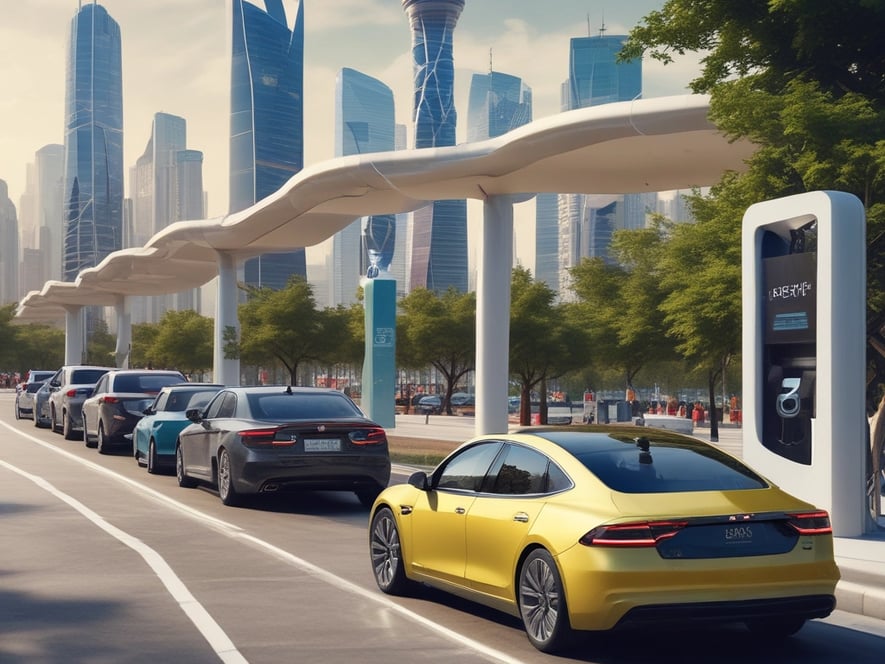"China’s Unstoppable EV Surge: Record-Breaking Sales Set the Global Stage for a New Automotive Era!"
"China has once again led the charge in the electric vehicle market, smashing records and accounting for almost 70% of global EV sales. As EV demand skyrockets, Europe and the U.S. face new challenges, but China's growth offers a glimpse of the future. Discover how China's dominance is reshaping the global EV market, driving innovation and competition."
BLOG POSTEVS NEWS
evnovatech.com
12/23/20244 min read


China Leads Global EV Sales with a Third Consecutive Record High: What You Need to Know.
The electric vehicle (EV) revolution is here, and China is leading the charge. As the global market continues its steady transition toward greener transportation, November 2024 marked a remarkable milestone: global EV sales surged by 32%, hitting a third consecutive record high. This growth isn't just a statistic; it signals a seismic shift in the automotive industry, driven largely by China's booming EV market. In fact, China now accounts for nearly 70% of total global EV sales, making it the undisputed leader in this emerging sector.
But what does this mean for the rest of the world, particularly Europe and the U.S.? Why is China pulling ahead, and what challenges do other regions face in keeping up?
The Global Surge in EV Sales
According to data from market research firm Rho Motion, global sales of both fully electric and plug-in hybrid vehicles jumped 32.3% in November 2024, with a total of 1.83 million units sold. This marks the seventh consecutive month of rising sales—a clear indicator of the growing global demand for electric vehicles.
But the spotlight remains firmly on China, where EV sales soared by 50%, reaching a staggering 1.27 million vehicles in November alone. This growth isn’t just impressive; it's game-changing. China’s dominance in the EV sector is driven by strong government incentives, a burgeoning domestic EV manufacturing industry, and a growing infrastructure that supports EV adoption.
In stark contrast, Europe saw a slight decline in sales, though a modest uptick from October’s figures offered a glimmer of hope. The U.S. and Canada saw a more modest rise in EV sales—up 16.8%—with a total of 170,000 units sold.
Why Is China Leading the Way?
China's rapid rise to the top of the global EV market isn't accidental. A combination of factors has propelled the country to the forefront of the EV revolution, including:
1. Government Incentives
The Chinese government has implemented aggressive incentives to promote the adoption of electric vehicles. Subsidies, tax breaks, and rebates for EV buyers have made electric cars more affordable and attractive to consumers. Additionally, the Chinese government has set ambitious carbon neutrality goals, further fueling the demand for clean energy transportation.
2. Domestic EV Manufacturers Like BYD
Chinese automakers like BYD (Build Your Dreams) have played a crucial role in the country's EV boom. BYD, in particular, is on track to surpass its global annual sales target and is poised to overtake American giants like Ford and Honda in sales. The company’s ability to scale up production quickly and efficiently has allowed it to dominate the market not only in China but also in export markets.
3. Expanding EV Infrastructure
China's massive investment in EV charging infrastructure is another key driver of its success. The country has built an extensive network of charging stations that make it easier for consumers to adopt electric vehicles. This infrastructure, combined with government support for new energy vehicles, has created a virtuous cycle that propels further growth.
The European and American Struggle
While China is thriving, Europe and the United States are facing more hurdles in their EV transitions. In Europe, the auto industry is grappling with high production costs, rising competition from China, and new emissions targets. As a result, many European manufacturers are struggling to keep up with the pace set by Chinese companies.
Trade tensions are also an issue. Growing tariffs and import duties have complicated the export of Chinese EVs to Europe and the U.S., putting pressure on the already strained supply chains. Moreover, the removal of government incentives in some European countries has made it harder for consumers to afford EVs, dampening demand.
Meanwhile, in the U.S., the situation is similarly complex. While EV sales are rising, automakers face challenges from stricter CO2 emissions rules, increasing trade tensions, and a lack of sufficient charging infrastructure in many regions. The EV market in the U.S. is still maturing, and while sales are increasing, the country faces obstacles in terms of affordability and infrastructure.
The Role of BYD: China’s Global Champion
A key player in China's EV dominance is BYD, a company that has set its sights on surpassing not just domestic competitors but also global giants like Ford and Honda. BYD has already exceeded its global sales targets, signaling the company's strength and potential in the international market. The company’s diverse portfolio of EVs—ranging from sedans to buses—has allowed it to capture a broad segment of the global market, making it a force to be reckoned with.
The Future of the Global EV Market
As China continues to expand its lead in the global EV market, the rest of the world will need to adapt or risk falling behind. In Europe and the U.S., the focus will need to shift toward innovation, cost reduction, and investment in charging infrastructure to remain competitive. At the same time, these regions will need to grapple with trade and regulatory challenges that complicate their ability to thrive in an increasingly electric world.
China’s dominance may continue for the foreseeable future, but the global EV market is far from one-sided. Europe and the U.S. are working to catch up, and with advancements in technology and infrastructure, they could still challenge China’s position in the long term. However, for now, the Chinese EV market is setting the pace, and the world is watching closely.
FAQ
1. Why is China leading the global EV market? China’s success in the EV market is driven by strong government incentives, massive domestic manufacturers like BYD, and robust EV infrastructure that supports widespread adoption.
2. How are European and American automakers responding to China's dominance? European and American automakers are facing challenges such as high production costs, stricter CO2 emissions regulations, and increasing competition from Chinese manufacturers. Both regions are focusing on innovation and investment in EV infrastructure to remain competitive.
3. What impact is China’s growth having on global EV sales? China’s rapid growth in the EV market is setting a high standard for other regions to follow, driving innovation and competition worldwide. As China continues to dominate, it challenges other countries to accelerate their own transitions to electric vehicles.
4. What role does BYD play in China’s success? BYD, one of China’s largest EV manufacturers, has exceeded its sales targets and is positioned to overtake global automakers like Ford and Honda. Its success is crucial to China’s rise as the global leader in electric vehicles.
